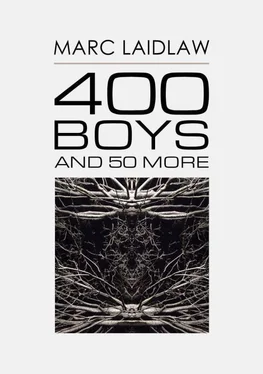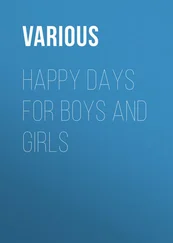They rode a small cylindrical lift up the trunk of the tower, stepping out onto a circular loft that gave a view through the trees of distant shore and a misty estuary. Wide white birds glided toward the waves. Seated before the vista, as if controlling it from a vast console of sliders and keys, was a man with long, thinning grey hair.
The squonking of the island’s ongoing soundtrack grew aggrieved. “Our resident composer,” said the Patron.
“Why are you disturbing me? Have I not asked you repeatedly to leave me off your tour?”
The composer would not turn around. He treated them to a view of his bald, spotty pate, and that was all.
“In most cases, I have respected that wish,” said the Patron. “But I felt an exception was necessary.” The Patron turned to Milston with an apologetic expression. “From time to time I may insist on a patron’s privilege. I trust I know better than to abuse it. Consider that we only come to admire the view.”
“Well you’ve seen it. Now be off!”
“I have been enjoying your latest compositions very much, I should mention,” said the Patron with apparent sincerity.
The bony white fingers paused on the keyboard. “I am told that in certain of the residences, speakers have been disabled!” The air trembled with an extended note not quite of melancholy… not quite of anything specific enough to characterize. Milston found himself staring at the poorly manicured fingers, the ragged, bitten nails, like visual equivalents of the sounds that had accompanied his tour.
“A pleasure meeting you,” he said, but there was no verbal reply from the composer, just another misplaced warble, a sonic non sequitur that sent the birds from the trees.
From the treehouse they proceeded to a vast kitchen complex, where chefs with names he almost recognized ordered about kitchen staff of only slightly lesser celebrity. Lunch was served above the waves, on an enclosed pier from which he could look back toward the island or out toward the undisturbed horizon. Each dish was a revelation.
“Imagine such miracles at every meal,” the Patron said. “And in every aspect of your life and work. Does it tempt you? There is much more still to see, but I wonder what you think so far?”
“You are persuasive,” Milston allowed himself to say.
“Well, it is not I alone… it is the enterprise. What we have here is a place that allows the fullest, finest flowering of human endeavor, in all its variety. The arts are permitted come into their own. What I get out of all this is something I cannot describe. To be patron… there is no greater honor or pleasure. Now, shall we go? There are others to meet. A tiny portion of our residents, but it should give you a taste of all you’ll have access to. Ultimately, our greatest resource is the community we’re gathering.”
“Before we continue, I just want to clarify the one stipulation that I’m sure has been a sticking point for many before me. The fact that…”
“You can never leave?”
“That one, yes.”
“Our residents find security in certainty. I can bring anything I like here, to the island, but nothing gets out. Nothing, and no one. A prison, some have called it, but one that allows for utter freedom of expression. I should think you especially would find this liberating, given that your own work has been so restricted, curtailed, and banned outright.”
“What about the rest of the world? Don’t you wonder if you’re robbing them of something essential? Something they might miss?”
“Does the world deserve them, Mr. Milston? Would that world miss you?”
Milston, sitting very still, said nothing more.
“Shall we?”
They rose and walked along the pier, once more back to a silent silver capsule.
The rest of the day was spent in the company of an extraordinary variety of extraordinary people—poets, painters, planners, programmers. At sunset they joined a party being held in a plaza by the sea. Milston mingled and the Patron disappeared, but Samira soon found him and introduced him to still more of the colony’s residents. The composer did not attend the fete, but he was there in spirit with a brooding score that made them all laugh, eliciting frequent snide remarks.
“Please tell me you are a new composer,” said an elderly woman with reflective pupils, but then she stopped his mouth with a finger. “No, don’t! For now, let us leave some mystery. There is little enough of that here, though each new arrival brings the hope of it.” And she gave him a wine-soaked kiss, with an expertly placed but feeble grasp at his crotch, which cost him nothing to endure.
It was full tropic dark but still early when the Patron found him in the crowd, and pulled him aside once more. “Mr. Milston, I have given you a full day of my time. This is all I can offer a prospective resident, I’m afraid. In the morning, we either put you on a plane and you never hear from me again, or you wake to begin your new life here. If the former, I very much enjoyed meeting you, and I regret but respect your decision. If the latter, then you may sleep in as late as you wish. There will be plenty of time for further orientation, and I promise you, I will enjoy following your work, and look forward to learning from the master. Now, your suite is ready if you are.”
They rode a silver car in silence through a landscape of artfully illuminated fountains and pools. Guests walked among the trees, watching the car pass, as if wondering what choice he had reached. But there had never really been any choice to make. When the car stopped before the bungalow where the day’s tour had begun, he shook the Patron’s hand and said, “I appear to be jet-lagged, apologies if I have not quite been myself. I’m sure I’ll feel better after a night’s rest. Can we meet again sometime tomorrow afternoon?”
“Perfect,” said the Patron. “I’ll leave instructions that you are not to be disturbed. Good night. And welcome. You’ve made a splendid choice.”
The silver car whispered away.
The house was small, but it had all the comforts and conveniences. He unpacked his suitcases and put his clothes away; found a bottle of very old whisky and a box of very young cigars, but these were not what tempted him. He went out onto the terrace and gazed over the gardens. He was braced and waiting for the aimless soundtrack to make one more offensive squawk when, suddenly, it stopped. The sounds of island night crept in. It was bliss. The landscape was sparingly painted with light, evocative as a dream. He saw hints of buildings through the trees, the glow of ornamental ponds, white coral pillars, miles and miles of gardens. A distant spire that must have belonged to the composer, now retired for the night. In the absence of music he felt he could finally think, could finally imagine what might take its place, what this garden truly needed.
“The finest, fullest flowering,” the Patron had stated, and indeed it was true. The place was in full bloom. But every garden needed pruning, and a blossom deserved to be lopped before its prime had passed, before its petals fell.
He set his black bag on the table, thinking of tools he had always wanted but never bothered to acquire, never daring to think he might get to use them. But that could come later. For now, he had all he needed to get started.
He took out his prize set of shears, edges gleaming, of pristine surgical steel.
I’ll begin with that composer’s horrible, hideous, ragged-nailed fingers, he thought, looking off toward the dark house of sound, imagining notes that were very sweet indeed.
* * *
“The Finest, Fullest Flowering” copyright 2016 by Marc Laidlaw. First appeared online at Nightmare Magazine , June 2016.
Читать дальше












